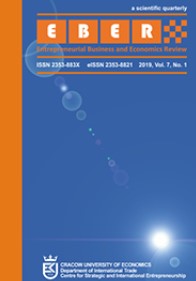Interdependence between human capital determinants and economic development: K-means regional clustering approach for Czechia and Poland
Interdependence between human capital determinants and economic development: K-means regional clustering approach for Czechia and Poland
Author(s): Michał Wielechowski, Denys Cherevyk, Katarzyna Czech, Pavel Kotyza, Łukasz Grzęda, Luboš SmutkaSubject(s): National Economy, Economic history, Economic development, Transformation Period (1990 - 2010), Present Times (2010 - today), Human Resources in Economy, Socio-Economic Research
Published by: Uniwersytet Ekonomiczny w Krakowie
Keywords: human capital determinants; economic development; regional clustering; k-means clustering; principal component analysis – PCA; Czechia; Poland;
Summary/Abstract: Objective: The objective of the article is to identify the groups of regions characterised by a similar level of human capital determinants and investigate the relationship between cluster-based human capital determinants and economic development. Research Design & Methods: We analyse key demographic, health, educational, labour, technological, and cultural determinants of human capital and the level of regional economic development. The research covers the period 2004-2019 for 14 Czech and 16 Polish regions. We apply k-means clustering improved by PCA using data for human capital determinants. To verify significant differences between distinguished clusters, we apply the Kruskal-Wallis test. To assess the interdependence between human capital determinants and regional economic development, we use Spearman rank correlation. Findings: We distinguish three clusters for Czechia and four clusters for Poland that differ significantly in terms of human capital determinants level. Moreover, we show that both Czech and Polish clusters significantly differ in the median level of GDP per capita. It implies the existence of interdependence between human capital determinants and economic development. We reveal a positive and significant relationship between GDP per capita and life expectancy, higher education rate, economic activity rate, and Internet access, and a negative and significant relationship between the number of library users and the regional economic development. The results are consistent for Czechia and Poland. Implications & Recommendations: Our study could create a new perspective for discussing similarities and differences in regional human capital development. The results could help decision-makers to identify the regions that need the most to stimulate the human capital determinants to reduce the differences in human capital, and in the long-term perspective, it might contribute to the regional economic development growth. Contribution & Value Added: Most studies analyse the relationship between human capital and economic growth and development using data for given regions or countries separately. Our contribution is that we first distinguish clusters representing regions with similar human capital levels. Then, based on cluster data, we assess the relationship between the human capital determinants and economic development. To the best of our knowledge, there have been no similar regional research studies conducted to daye, including Czechia and Poland.
Journal: Entrepreneurial Business and Economics Review
- Issue Year: 9/2021
- Issue No: 4
- Page Range: 173-194
- Page Count: 22
- Language: English

